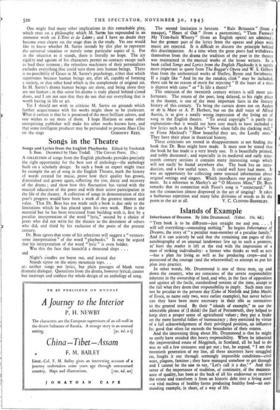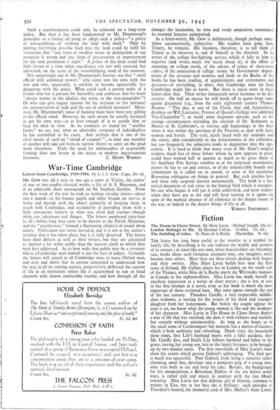Islands of Example
Inheritance of Dreams. By John Drummond. (Faber. 10s. 6d.)
"THIS book is to be different—just straight me and you. . . . I will tell everything—concealing nothing." So begins Inheritance of Dreams, the story of "a peculiar man-member of a peculiar family." And if it can scarcely be said that the remaining 200 pages of this autobiography of an unusual landowner live up to such a promise, at' least the reader is left at the end with the impression of a man of striking individuality : a farmer who thinks as well as acts —has a plan for living as well as for producing crops—and is possessed of the courage (and the wherewithal) to attempt to put his plan into practice.
In other words, Mr. Drummond is one of those men, up and down the country, who are conscious of the severe responsibility inherent in the ownership of land, and who, in the face of opposition and against all the facile, standardised notions of the time, accept to the full what they deem that responsibility to imply. Such men may not be peculiar to the present day (Coke of Norfolk and John Mechi of Essex, to name only two, were earlier examples), but never before can they have been more necessary in their role as correctives to the general trend. By their "islands of example," to use the admirable phrase of (I think) the Earl of Portsmouth, they helped to keep alert a proper sense of agricultural values ; they put a brake on the more harmful follies of bureaucracy they exercised by virtue of a full acknowledgement of their privileged position, an influence fry: good that often far exceeds the boundaries of their estates.
And the interesting thing about Mr. Drummond is that he might so easily have avoided this heavy responsibility. When he inherited the impoverished estate of Megginch, in Scotland, all he had to do was to sell a few treasures and get out ; but, he argued, "I am the twentieth generation of my line, all these ancestors have struggled on, fought it out through seemingly impossible conditions—civil wars, plagues, famines ; they have managed somehow to get through and I cannot be the one to say, 'Let's -call it a day.'" And this sense of the importance of tradition, of continuity, of the mainten- ance of quality, has been at the backof all his endeavour to retrieve the estate and transform it from an historic debt into a living asset —a vital nucleus of healthy farms producing healthy food—an out- standing example, in short, of a way of life.
Such a transformations could only be achieved on a long-term policy. But then it has been fundamental to Mr. Drummond's principles as a farmer all along to adopt such a policy—" a policy of non-grabbing—of working the land with stock." Only by putting everything possible back into the land could he fulfil his conviction that "any form of needless waste or destruction of our resources is wrong and any form of preservation or improvement for the next generation is right." A policy of this kind could find little favour at a time when expediency was not only excused, but advocated, on the score of the overwhelming need of the moment.
Not surprisingly one of Mr. Drummond's horrors was that "small official with unlimited powers" who came into his own with the war and who, apparently, is unlikely to become appreciably less dangerous with the peace. What could such a person make of a farmer who has a passion for butterflies and confesses that his heart " always warms to the idealist, the artist, or the non-materialist "? Or who can give cogent reasons for his aversion to (for instance) the pasteurisation of milk and the use of artificial manures? More- over, Mr. Drummond's sense of humour must have been very galling to the official mind. However, by such means he usually managed to get his own way—or at least enough of it to enable him to keep his ideal in view. As he conducts us round his "satellite farms," we see, too, what an admirable company of individualists he has assembled to his cause. And perhaps that is one of the chief merits of such an "island of example" ; in time one member or another will take sail from its narrow shores to carry on the good work elsewhere. Truly the need for ambassadors of responsible farming does not lessen as the access to modern improvements































 Previous page
Previous page